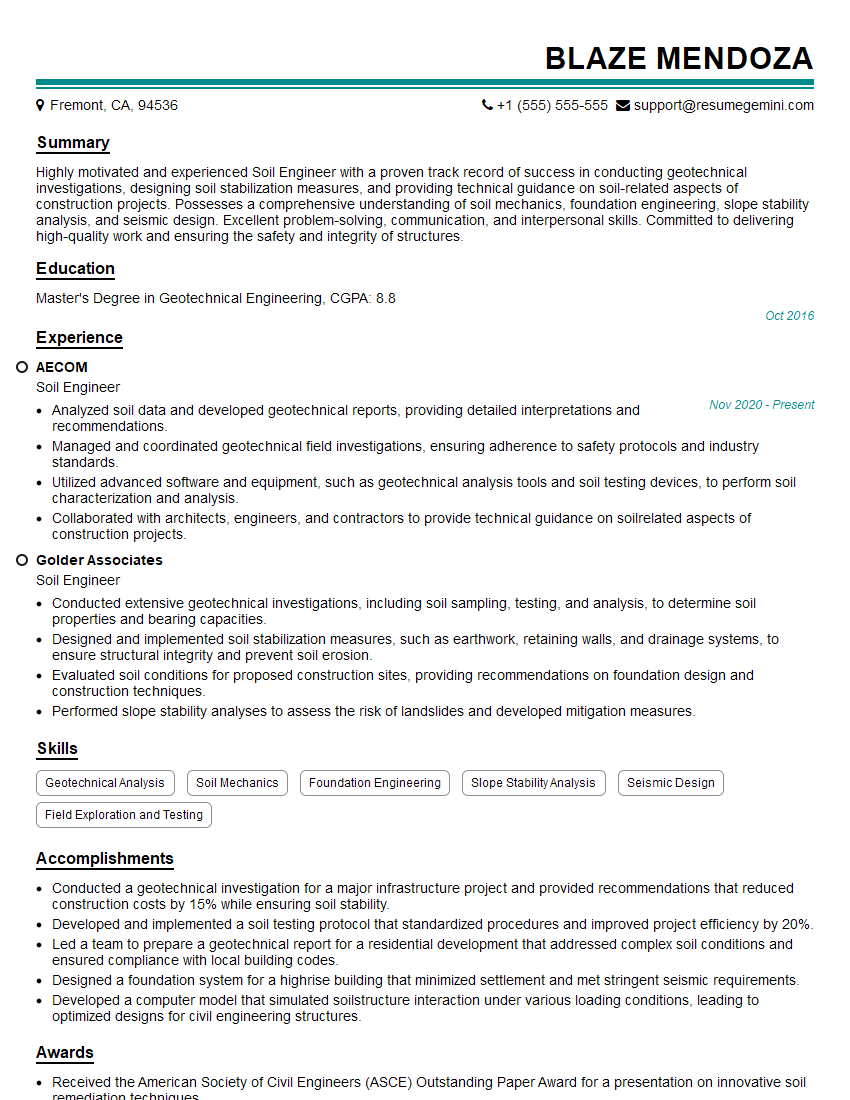Are you a seasoned Soil Engineer seeking a new career path? Discover our professionally built Soil Engineer Resume Template. This time-saving tool provides a solid foundation for your job search. Simply click “Edit Resume” to customize it with your unique experiences and achievements. Customize fonts and colors to match your personal style and increase your chances of landing your dream job. Explore more Resume Templates for additional options.

Blaze Mendoza
Soil Engineer
Summary
Highly motivated and experienced Soil Engineer with a proven track record of success in conducting geotechnical investigations, designing soil stabilization measures, and providing technical guidance on soil-related aspects of construction projects. Possesses a comprehensive understanding of soil mechanics, foundation engineering, slope stability analysis, and seismic design. Excellent problem-solving, communication, and interpersonal skills. Committed to delivering high-quality work and ensuring the safety and integrity of structures.
Education
Master’s Degree in Geotechnical Engineering
October 2016
Skills
- Geotechnical Analysis
- Soil Mechanics
- Foundation Engineering
- Slope Stability Analysis
- Seismic Design
- Field Exploration and Testing
Work Experience
Soil Engineer
- Analyzed soil data and developed geotechnical reports, providing detailed interpretations and recommendations.
- Managed and coordinated geotechnical field investigations, ensuring adherence to safety protocols and industry standards.
- Utilized advanced software and equipment, such as geotechnical analysis tools and soil testing devices, to perform soil characterization and analysis.
- Collaborated with architects, engineers, and contractors to provide technical guidance on soilrelated aspects of construction projects.
Soil Engineer
- Conducted extensive geotechnical investigations, including soil sampling, testing, and analysis, to determine soil properties and bearing capacities.
- Designed and implemented soil stabilization measures, such as earthwork, retaining walls, and drainage systems, to ensure structural integrity and prevent soil erosion.
- Evaluated soil conditions for proposed construction sites, providing recommendations on foundation design and construction techniques.
- Performed slope stability analyses to assess the risk of landslides and developed mitigation measures.
Accomplishments
- Conducted a geotechnical investigation for a major infrastructure project and provided recommendations that reduced construction costs by 15% while ensuring soil stability.
- Developed and implemented a soil testing protocol that standardized procedures and improved project efficiency by 20%.
- Led a team to prepare a geotechnical report for a residential development that addressed complex soil conditions and ensured compliance with local building codes.
- Designed a foundation system for a highrise building that minimized settlement and met stringent seismic requirements.
- Developed a computer model that simulated soilstructure interaction under various loading conditions, leading to optimized designs for civil engineering structures.
Awards
- Received the American Society of Civil Engineers (ASCE) Outstanding Paper Award for a presentation on innovative soil remediation techniques.
- Recognized by the Association of Geotechnical and Geoenvironmental Specialists (AGS) for exceptional contributions to the field.
- Awarded a grant from the National Science Foundation to research the impact of soil moisture on slope stability.
- Recipient of the Soil Science Society of Americas Young Scientist Award for groundbreaking work in soil mechanics.
Certificates
- Professional Engineer (PE) License
- Certified Soil Engineer (CSE)
- Geotechnical Specialty Certification (GSP)
- OSHA 40-Hour HAZWOPER Training
Career Expert Tips:
- Select the ideal resume template to showcase your professional experience effectively.
- Master the art of resume writing to highlight your unique qualifications and achievements.
- Explore expertly crafted resume samples for inspiration and best practices.
- Build your best resume for free this new year with ResumeGemini. Enjoy exclusive discounts on ATS optimized resume templates.
How To Write Resume For Soil Engineer
- Quantify your accomplishments and provide specific examples of your work.
- Highlight your technical skills and knowledge of geotechnical engineering principles.
- Demonstrate your understanding of the latest industry standards and best practices.
- Emphasize your problem-solving abilities and ability to work independently and as part of a team.
Essential Experience Highlights for a Strong Soil Engineer Resume
- Conducted extensive geotechnical investigations, including soil sampling, testing, and analysis, to determine soil properties and bearing capacities.
- Designed and implemented soil stabilization measures, such as earthwork, retaining walls, and drainage systems, to ensure structural integrity and prevent soil erosion.
- Evaluated soil conditions for proposed construction sites, providing recommendations on foundation design and construction techniques.
- Performed slope stability analyses to assess the risk of landslides and developed mitigation measures.
- Analyzed soil data and developed geotechnical reports, providing detailed interpretations and recommendations.
- Managed and coordinated geotechnical field investigations, ensuring adherence to safety protocols and industry standards.
- Utilized advanced software and equipment, such as geotechnical analysis tools and soil testing devices, to perform soil characterization and analysis.
Frequently Asked Questions (FAQ’s) For Soil Engineer
What is a Soil Engineer?
A Soil Engineer is a professional who specializes in the study of soil and its behavior. They are responsible for evaluating soil conditions, designing soil stabilization measures, and providing recommendations on foundation design and construction techniques.
What are the required qualifications to become a Soil Engineer?
Most Soil Engineers hold a Bachelor’s or Master’s degree in Geotechnical Engineering or a related field. They also typically have several years of experience working in the field.
What are the key responsibilities of a Soil Engineer?
The key responsibilities of a Soil Engineer include conducting geotechnical investigations, designing soil stabilization measures, evaluating soil conditions, performing slope stability analyses, and analyzing soil data.
What are the career prospects for Soil Engineers?
The career prospects for Soil Engineers are good. The demand for qualified Soil Engineers is expected to grow in the coming years as construction projects become more complex and environmentally conscious.
What are the challenges faced by Soil Engineers?
The challenges faced by Soil Engineers include dealing with complex soil conditions, ensuring the safety and integrity of structures, and staying up-to-date with the latest industry standards and best practices.
What are the key skills required to be a successful Soil Engineer?
The key skills required to be a successful Soil Engineer include technical expertise, problem-solving abilities, communication skills, and teamwork skills.